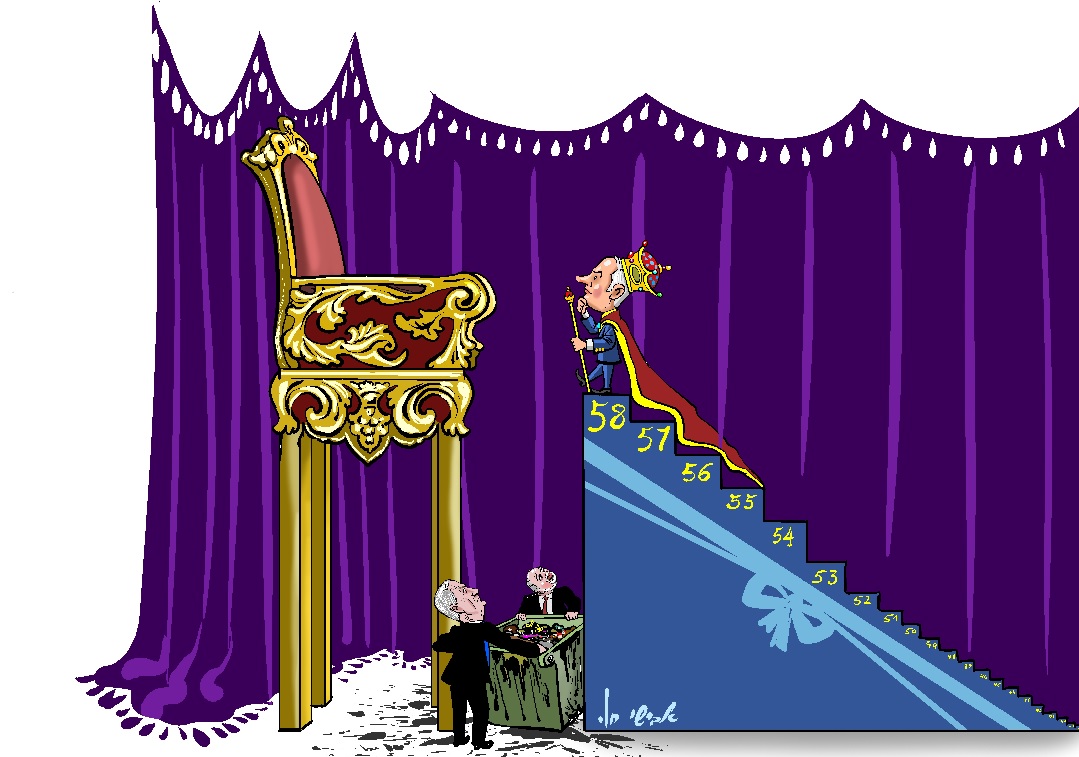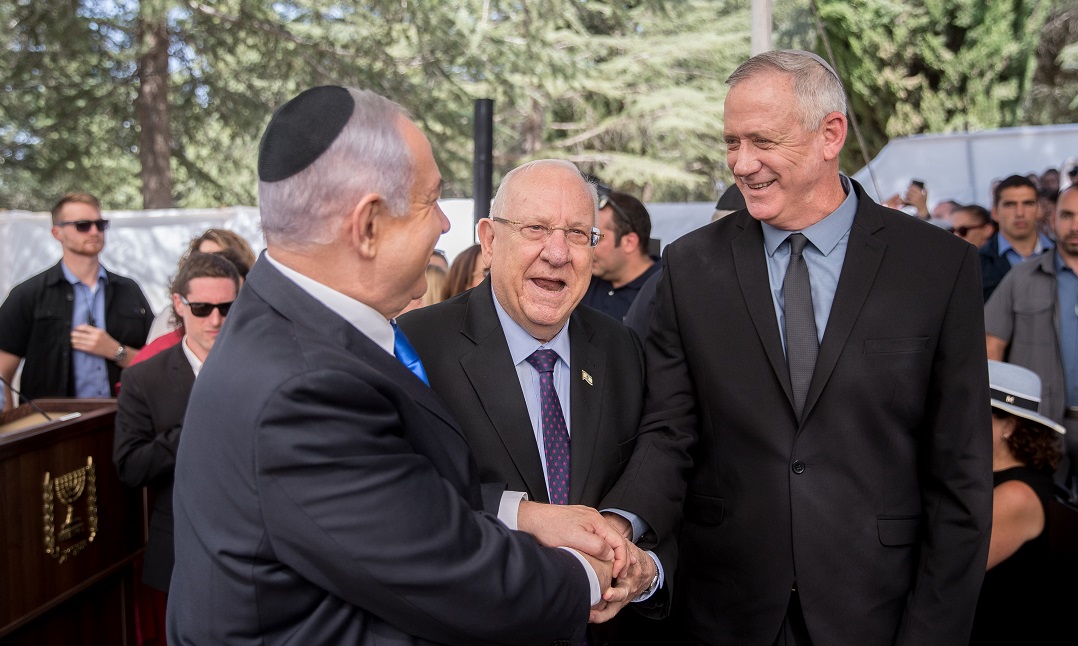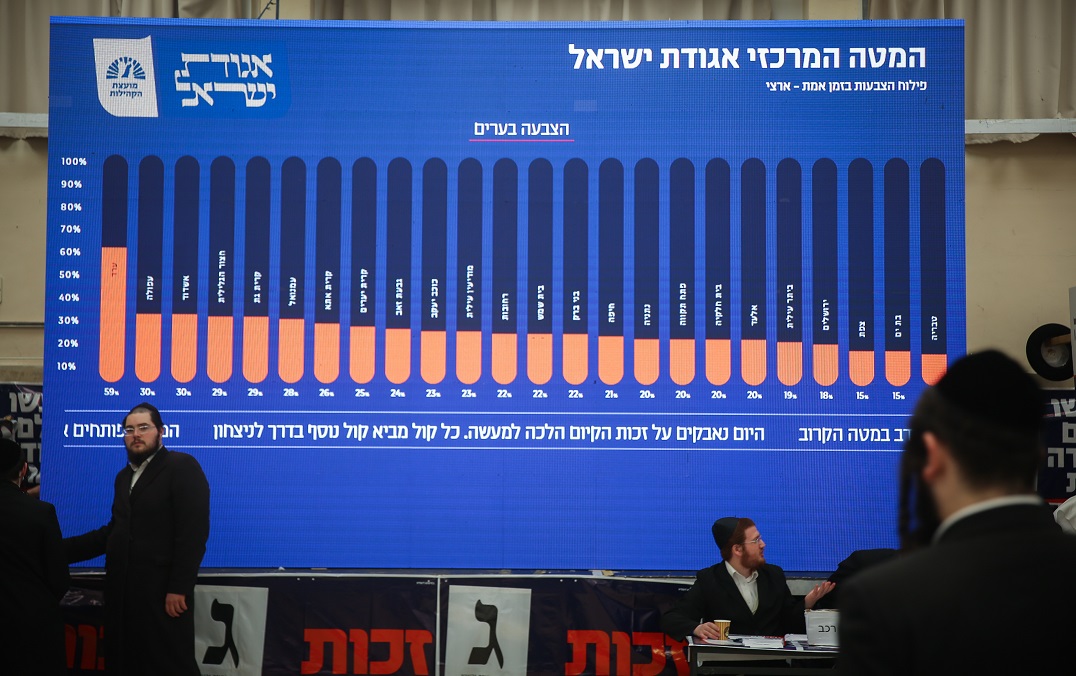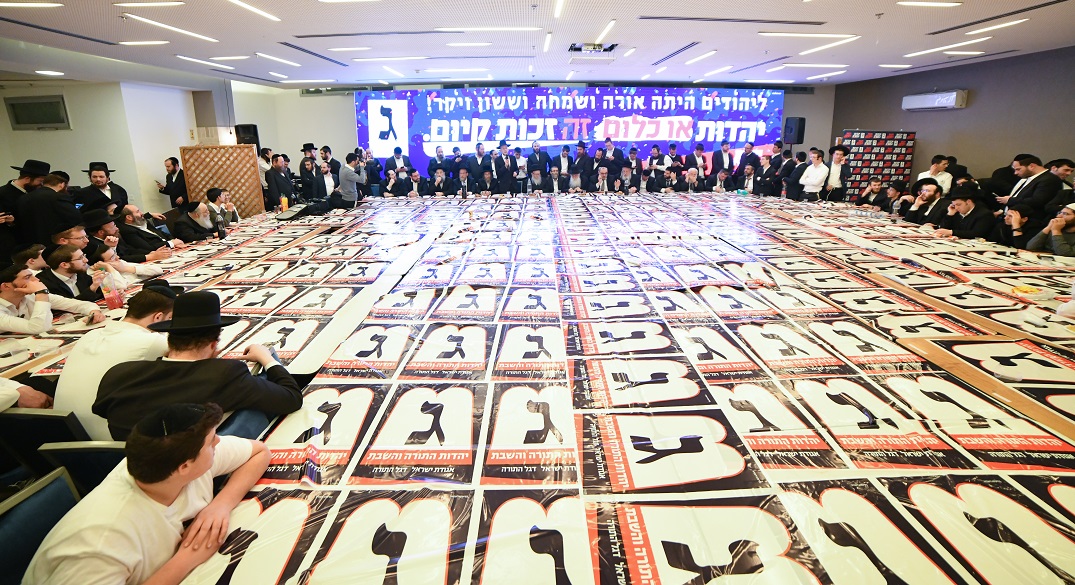A Bittersweet Victory: Inside Shas Headquarters
| March 5, 2020The night began with resounding joy that dissipated the tension, and concluded with big hopes and doubts about the future. Mishpacha accompanied a chief campaign staffer from the time the polls closed to the final results.

Monday, 9:00 PM // An hour till the polls close
I
t’s tense at Shas campaign headquarters on Shimon Hatzaddik Street in Jerusalem. The large hall, decorated ahead of the arrival of hundreds of campaign activists, is largely empty save for GSS security personnel, some organizers, and production workers. Nothing hints at the celebration planned for two hours hence. At this point, some of the staffers are still afraid there won’t be much to celebrate. The rise in the turnout of the secular public, and rumors of low turnout in the chareidi areas, are a heavy cloud. True, according to the leaks, the Likud is in for a major victory. But the increased number of voters has a negative effect on the chareidi parties, which, as it is, are maximizing their potential voter base. With the rise in turnout, the threshold for each mandate will be higher.
One thing is clear: The traditional cries of gevald are outdated. After three times in one year, as thousands of activists felt their heart sink at the hysterical pressure exerted by the party leaders in the hours before polls closed, it won’t work anymore.
The fact that this time the results were satisfactory as well prove that these cries of alarm are baseless and it is doubtful if next time — who knows, perhaps in just a few months — the worn-out mantra will work again.
Shas attributes its success to the campaign staff, headed by Oren Elimelech, Yaakov Bichler, Avi Lerner, and Asher Medina. They conducted a professional, focused, and emotional campaign that touched the hearts of voters — and that was manifested at the polls.
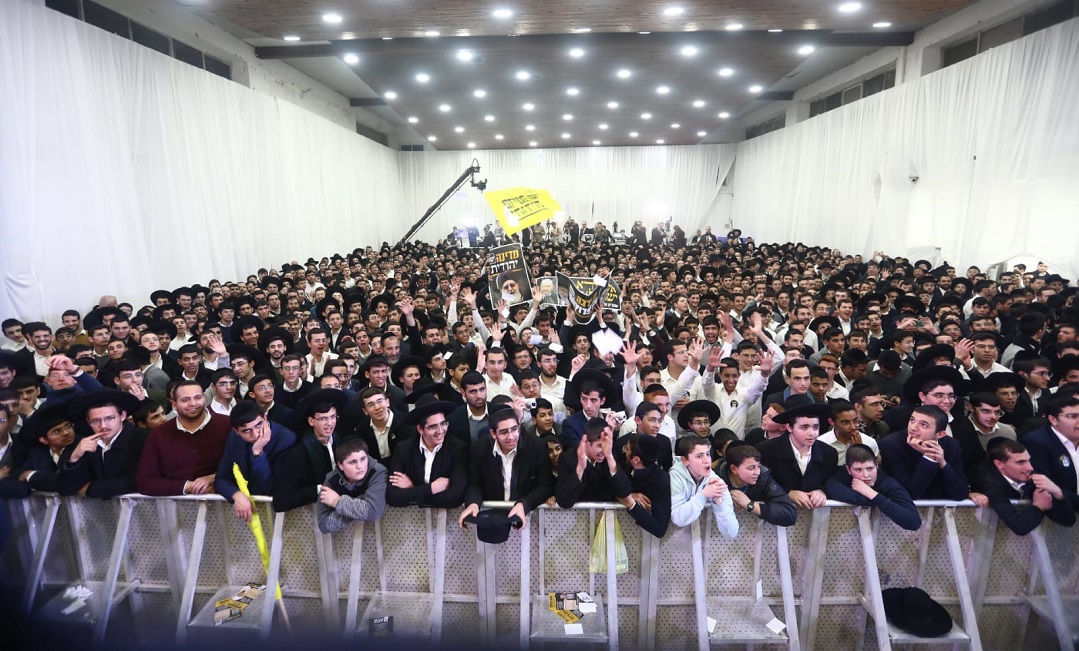
Monday, 9:30 PM // Half hour to exit polls
T
he headquarters are still empty; in just a few minutes, security will allow entrance to the activists, some of whom are still on their phones trying to canvass another voter or two to cast a ballot at the last minute. “The GSS overdid it this time,” says Yosef Chaim, an energetic young man holding a printed chart with the names of potential voters.
“They closed off the entrance to the building since the afternoon, and only let us in now. The last few times it wasn’t like this.” In the middle of our conversation, Yosef Chaim gets a call and hurries to answer. “Hello, this is Shas headquarters,” he says. “Have you gone to vote yet?” When he discovers that the person on the other end hasn’t voted yet, he gets frantic, dashes out of the hall, and tries to deal with the problem.
A few moments later, the hall is full of people, most of them still busy on their phones. Who knows, maybe a potential voter who didn’t answer the phone will call them back. They don’t move their eyes from the large screens behind the stage.
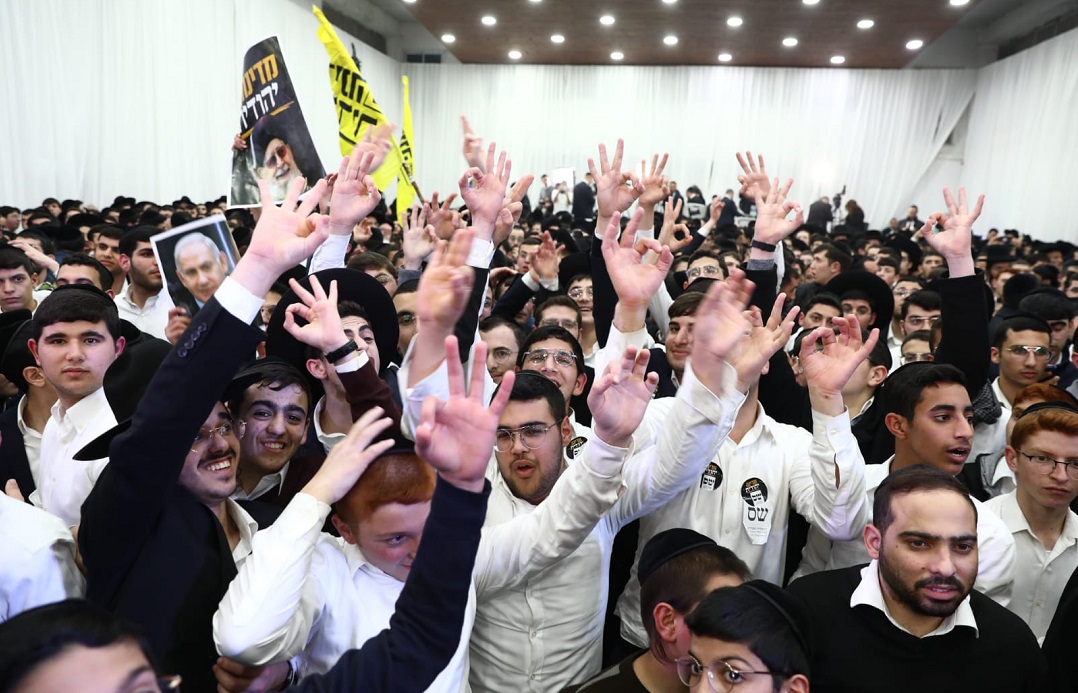
Monday, 9:59 PM // Exit Poll Dancing
Y
ou can virtually hear the hearts of the young activists pounding. The tension of three election campaigns is at the boiling point now. Maybe it will finally end, each of them thinks as they cram the hall. If there was a graph illustrating the decibel level in the hall before and after the release of the exit polls, it probably would show a sharp, diagonal line. The screaming that fills the hall when it becomes clear that Shas has preserved its power, and that the right bloc had reached the magic number of 60, tells the whole story.
True, nothing is final yet. But who has time for that?
Near the entrance to the stage there is a bit of a tussle as the GSS security guards prevent the entry of aides of MKs who are not on their list of people allowed onto the stage. “There are important people here, it’s unreasonable not to let them on,” Yosef Chaim fumes. But nothing changes the minds of the somber-faced bodyguards, who physically block the stairs to the stage.
I didn’t meet Yosef Chaim again in the mass of people, but manage to get the attention of Yehudah Cohen, a well known Shas activist, for a few minutes of conversation despite the feverish activity in headquarters at that moment.
“We feel like a stone has rolled off our heart,” he says — although it’s more like a shout. “All day there’s been uncertainty about the results because of the high turnout, but the exit polls show we have maintained our strength and there is no greater joy for us.”
Cohen, who worked at headquarters on Election Day and the days prior, tells us that he thinks the work on the homestretch brought about the successful outcome. “In the afternoon, everyone was talking about a low turnout in chareidi areas, which put us under pressure. If the figure was right and the general voter turnout was stronger — we could have lost one or two mandates. This pressure galvanized every person to go over their list of contacts or lists that they received from others, and to just keep calling, until almost ten o’clock.”
Yehudah Cohen is a well-known figure on the Shas scene. He is remembered mainly for hoisting Aryeh Deri onto his shoulders after his speech on the last election night, and this week, he did so again during the celebrations. “It’s an unexplained explosion of joy. I didn’t plan to go up there and lift Minister Deri, but with the singing and the whole atmosphere, it just seemed called for.”
Monday, 10:30 PM // Victor on the Shoulders
T
he MKs start trickling onto the dais. Each one is welcomed with cheers from the activists. One of the colorful figures, Avshalom Ohayon, known to all as Avrasha, climbs onto a chair, and despite the huge din, everyone hears his voice when he screams praises of Minister Deri. Less than half an hour later the signal was given. Shas chairman Minister Aryeh Deri entered the hall, surrounded by a coterie of close aides. It’s enough to glance at Deri’s face to realize that he is pleased. Very much so.
He is hoarse and tired, but his eyes are fiery. In another minute he will thank the nasi of the Moetzet Chachmei HaTorah, Rav Shalom Cohen, and the members of the Moetzet, but they all know that at least in the case of Shas, here, the emissary is much more than just someone who carries out instructions. He is the one who absorbs the spears and arrows for any other result. Everyone would have been talking about his failure. This time, Deri gambled the whole pot. He was more invested in the Likud’s victory than any other MK. He is the founding father of the right-wing bloc. He is the man who is moved to tears by the news of a 60-MK bloc.
He knows what a great moment this is. He realizes that he is on prime time of all the channels. And he takes this moment to scream into the microphone, with Hashem’s Name, “Zeh hayom asah Hashem, nagilah v’nismechah bo.”
The activists all shout hoarsely. He can hardly get a word in edgewise. Someone from below puts him on their shoulders. The activists are all fired up. The hall becomes a shul. They sing Purim songs. Suddenly everyone understands how frightening these elections were. ‘Teshuasam hayita lanetzach vetikvasam bechol dor vador.”
Deri gets down. He makes it clear that he is heading for the establishment of a right-wing government. “Tomorrow the leaders of the right-wing bloc will meet with Prime Minister Netanyahu, and we will implement the decision that the nation made today and establish a government headed by Netanyahu.”
Despite the cries of “Lieberman go home” the Shas chairman does not mention the party which, at exit-poll time, looked like it had lost its power as the deciding factor. “We will approve a budget, and then we will expand the government,” he declared. “Now the goal is to establish a government immediately and that is what we are going to do.”
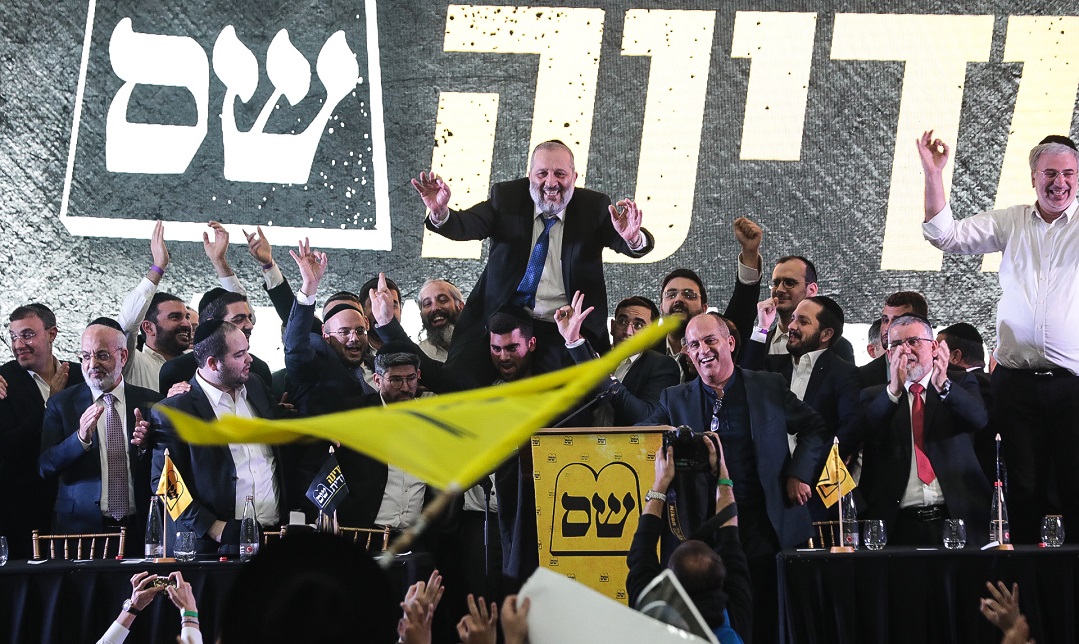
A Sleepless Night and An Unstable Bloc
O
n Monday night this week, Shas supporters went to sleep with the knowledge that the party had maintained its strength. The next morning, the figures were even more surprising, but not for long. Early on Tuesday, Shas reportedly had gone up another two seats, but later it stabilized at ten mandates. But as of Wednesday morning, the number was back to nine.
Senior party officials, experienced from two previous elections, did not race to exult; they waited to see the number of mandates for the right-wing bloc, a number not yet officially publicized. But it appears that it will be 58 to 59 seats. In the last election, the rise in the party’s power did not yield any results and the understanding in Shas is that it is preferable to have a lower number for the party if it will lead to the bloc having the coveted 61.
“The number of potential Shas voters is over 400,000,” claims MK Michael Malchieli. “Over the years, we saw that those voters, indeed, voted for Shas, like in 1999, when we got 17 seats. In the recent elections, what is happening is that those votes are slowly, slowly coming back.”
According to the MKs, there are a number of reasons for Shas’s increased strength. “First of all, is the loyalty to Netanyahu. In addition, there’s the issue of the Jewish state. More people realize that this is an important issue, and Shas is the address for matters of Yiddishkeit. Among the new communities that joined Shas are Chabad chassidim, Breslov, working chareidim, and members of the Ethiopian community.”
Shas officials are also pointing to a surprising figure: a stream of Ashkenazic chareidim who switched from UTJ to Shas in the last election. Jerusalem perhaps offers a small example of this trend: UTJ saw a decline of 3,800 votes compared to the last election and Shas increased by 1,800. The assumption is that the last election maximized the chareidi bank of voters in both communities after national elections and a stormy municipal campaign.
“Ultimately,” says Asher Medina, who is part of the party’s hasbarah team, “Shas is in the most dignified place in its history. This is something we have never seen. Today Deri is the closest person to Netanyahu from all the right-wing parties, and this will be evident in the next government.”
There was news that the veto on Lieberman was lifted.
“I imagine that if it is raised for discussion, the members of the Moetzet will decide, but right now I don’t see the public agreeing to such a move. Lieberman has attacked anything that is holy and precious to us.”
Is there any talk of portfolios yet?
“Not right now. We are still traumatized form this past year. After three elections in a year, all we wanted was decisiveness. The discussion over portfolios will begin in the coming days. Now all we can say is that Shas will be a central component of the government.”
Tuesday, 7:00 AM // A Private Shacharis
A
ryeh Deri is the first to recover from the euphoria. On Tuesday morning, he did not go to shul to daven. He invited a few confidants for davening in his home. He has no strength to face the media cameras that are camped outside his house.
His wife, Yaffa Deri, volunteers to talk to the media and gives a short interview. She said they feel wonderful. “Aryeh has done what no one else has. He invested his heart.” The obvious exhaustion on her face indicates that she is also involved in this investment.
At lunchtime, Deri met at length with the prime minister. After about an hour, the heads of the right-wing bloc factions were called for a meeting. Then they issued a statement that they will not rule out the entry of “parties that recognize the State of Israel as a Jewish and democratic state.” For many, this was a call to come to the negotiating table to join a right-wing government.
Even after the “double envelope” votes are counted — and there are an estimated 400,000 votes — the number of mandates in the right-wing bloc remain at 58 or 59, two short of a government. “We are nearing the 61,” Deri said when he emerged from the meeting. But at the moment, this does not seem to be the case.
“Ultimately, the most interesting figure is Shas’s increase in the number of votes,” says Shas executive director Chaim Biton. “In the last year, the party gained 120,000 new votes, of which 20,000 are votes that appeared only for this election. This says a lot about a party that, just a year ago, was being talked about by pollsters as teetering on the electoral threshold.”
We saw that Shas also got stronger; where did these votes come from?
“In the last year, Shas rebuilt itself. There’s the work of the members of the Moetzet who bring out the communities, and connections to new communities such as Chabad, and lots of traditional votes that return to Shas. The understanding that Deri is the mature and responsible adult in the government has also led many to vote for the party. Most of all, there was a focused, targeted campaign and lots of groundwork. In the end, these all play a vital role.”
During the campaign, there was talk about cooperation between Shas and Likud campaign offices; where is this manifested?
“Shas has maintained a database for nearly 20 years. It keeps track of all the party’s supporters, and with each election, we refresh the list, erase people who passed away and make phone calls to the rest to make sure their support is still there. We persuade anyone who is not supportive, and that is how we get to everyone by Election Day.”
What is source of this data?
“Most of it is from public relations, local representatives, and activists all over the country. The database is always being refreshed and synchronized with CEC figures. Each time we get a disk from the CEC about voters, we update our list. We find out who isn’t relevant, add new supporters, and then the telemarketing department reviews each of them.”
How many people are in the system?
“That’s a professional secret, but I can tell you that it numbers hundreds of thousands. It’s not very different from the number of our voters. The idea is to get everyone to go vote on Election Day, whether by SMS, a recorded call by the nasi of the Moetzet, or phone calls from the headquarters, among others. This urging is significant. Let’s say there is a person who was invited to a wedding but his son is sick that day and he’s thinking of skipping it. If the chassan’s father calls to remind him about the invitation, he will certainly go even if he had already decided to stay home. These conversations bring voters to the polls.”
Tuesday, 7:00 PM // It’s Not Over
D
uring Election Day, the party’s national headquarters are updated regarding voter turnout. “The supervisors update us who voted and we insert it into the database, and we cross-reference to see if that person is a Shas supporter. If so, he is marked as having voted, then we know it’s not necessary to call him. The connection with the polling station supervisors is done through an app, a phone call to a special hotline, or an SMS message.”
The cooperation with the Likud headquarters was on the method of feeding the data. “The database is not given over to Likud in any shape or form,” Biton clarifies. “But the method is. In the past, the Likud did not work with a bank of voters; rather, they would push everyone to go vote. The ruling party with more than one million voters cannot work on an individual level. What they got from us was the bank of figures of who voted and who did not. There was cooperation among the supervisors. They sat at meetings with us on how to work the systems, and our experience surely helped their efforts.”
Is it possible that at eight o’clock on the night of elections you could know how many mandates Shas has?
“Not with complete precision because there are calculations of the Bader-Ofer Law. The list of supporters is also not 100 percent accurate. We do see trends, for example, with the previous election we warned the Likud that they were losing. I get all the lists of the voters in a polling station, and when you see that there is a high number of voters in Ramat Hasharon and a low number in Be’er Sheva, I know that that indicates a decline for the Likud. I think that the tip that the Likud got from us to go out into the field and raise the voter turnout is what generated their increased number of mandates.”
Despite it not being an outright victory for the right-wing bloc, because there aren’t enough mandates to make a government, Shas is pleased with the results and hopes there will be defectors that will make it possible to form a coalition. “One thing is clear,” Biton says. “Shas will be a major component in the next government. The relationship between Bibi and Deri is very close. There was a conversation as the exit polls were released, and they were very excited. There is a real connection and they view each other as real partners. So although there will be vigorous negotiations with other parties, in the end a government will happen.”
Might we see Deri as finance minister?
“I don’t think the Finance Ministry is the most effective. What Aryeh did in the Interior Ministry affected the individual citizens more, and there was a lot of change. Right now it’s had to know what will be but the Finance Ministry is not that desirable. One thing I can guarantee you,” Biton concludes. “We will see more Shas members as MKs in the next Knesset. We will demand the Norwegian Law. Right now I don’t know if it will be an expanded Norwegian Law, which allows the resignation of several ministers at once, but even if it will be the scaled-down law, we will gain one or two new representatives in Knesset.”
(Mishpacha.com)
Oops! We could not locate your form.






